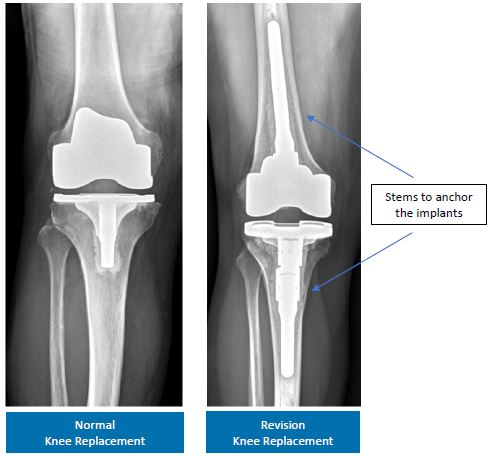Revision Joint Replacement Surgery
Home » Core department » Revision Joint Replacement Surgery

Introduction
If your primary/initial knee or hip replacement surgery doesn’t work out as expected, your doctor might suggest a second surgery known as Revision Knee or Hip Replacement.
During this procedure, your doctor will remove some or all of the original prosthesis and replace it with new parts.
While both primary and revision knee replacements aim to alleviate pain and improve function, revision surgery is a bit different. It’s more intricate and lengthier procedure that requires careful planning, specialized implants, and tools to ensure a successful outcome.
We at Welcare Hospital, Vadodara get many patients from all over India for this highly specialized form of Joint Replacement Surgery.
When it comes to choosing a hospital for joint replacement surgery, it is important to find a facility that combines experience, advanced technology, and compassionate care. Welcare Hospital, located in the heart of Vadodara, is renowned for its exceptional orthopedic care. Our joint replacement surgeon in vadodara has extensive experience in performing complex surgeries, and our dedicated team will ensure you receive the best care possible from start to finish.
At Welcare Hospital, we understand that joint replacement surgery can be a significant decision, and it’s natural to have many questions. To help you better understand the process, we’ve answered some of the most commonly asked questions about joint replacement surgery in Vadodara.
A knee replacement may need to be revised for several reasons.
Here are the primary reasons:
- Pain: Pain is the most common reason for revision. The cause is usually identifiable, but not always. Knees without an obvious cause for pain generally do not fare as well after revision surgery.
- Plastic (polyethylene) wear: This type of revision is simpler, involving only the replacement of the plastic insert.
- Instability: The knee may feel unstable, giving way, or not feeling secure when walking.
- Loosening of components: The femoral, tibial, or patella component may loosen, typically presenting as pain, though it can be asymptomatic. Regular follow-ups and X-rays are necessary to detect loosening early, even if there are no symptoms.
- Infection: Usually presents as pain, but can also cause swelling or an acute fever.
- Osteolysis (bone loss): Bone loss can occur due to particles being released into the knee joint, leading to bone destruction.
- Stiffness: Although challenging to improve with revision, stiffness should be addressed in consultation.
Individuals with failed knee replacements may experience pain, swelling, and stiffness in their knee, which can make walking and carrying out daily activities challenging.
Is surgery the only option available?
If your symptoms are not severe, you and your surgeon might consider monitoring the situation for a while. In case your knee replacement keeps dislocating, wearing a brace could help keep it in position. If there is an infection in your knee replacement, long-term antibiotic use may prevent it from failing. Additionally, if you have a fracture near your knee but the replacement is still securely attached to the bone, your surgeon might be able to repair the break using plates and screws without altering the knee replacement. In some cases, a splint or cast can be used to treat the fracture.
Why Welcare hosptial vadodara for joint replacement surgery?
We at Welcare Hospital specialize in Revision Surgeries as, not all doctors can perform revision knee surgery due to its complexity and the specialised skills required. The Welcare Team, under the leadership of world renowned surgeon Dr. Bharat Mody, has accumulated huge experience and expertise in this advanced form of joint replacement surgery.
Along with Joint Replacement Specialist in Vadodara : Dr. Kshitij Mody and Dr. Aashay Mody, the team has a collective experience of more than 5000 revision procedures to their credit.
Why should a patient be careful in choosing a hospital and surgical team for a Revision Joint Surgery?
- Specialised Training: Revision knee surgery requires additional training beyond standard orthopaedic surgery.
- Experience: Surgeons need extensive experience in knee replacement surgeries to handle the complexities of revisions.
- Complex Anatomy: Revision surgeries involve dealing with altered anatomy and scar tissue from the previous surgery.
- Advanced Planning: These surgeries require meticulous preoperative planning, often using advanced imaging techniques.
- Specialised Equipment: Revision procedures require specialised instruments and implants not used in primary knee replacements.
- Extended Surgery Time: Revision surgeries take longer to perform, demanding greater stamina and concentration.
- Higher Risk of Complications: The risk of complications is higher, requiring a surgeon skilled in managing these risks.
- In-depth Knowledge of Failure Mechanisms: Surgeons must understand the various reasons for knee replacement failure to address them effectively.
- Customised Implants: Often, customised or modular implants are needed, requiring precise surgical techniques.
- Bone Loss Management: Revision surgeries frequently involve significant bone loss, necessitating advanced techniques for reconstruction.
- Soft Tissue Management: There is often a need for extensive soft tissue balancing and repair.
- Infection Control: Managing and preventing infections in revision surgery is more challenging and requires expertise.
- Patient Evaluation: Assessing the patient’s overall health and suitability for revision surgery requires comprehensive evaluation skills.
- Multidisciplinary Approach: Surgeons often need to work closely with other specialists, such as infectious disease experts or radiologists.
- Postoperative Care: The postoperative care and rehabilitation protocols for revision surgery are more complex, requiring careful management to ensure successful outcomes.
